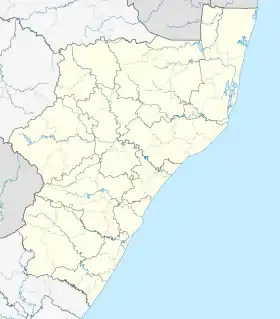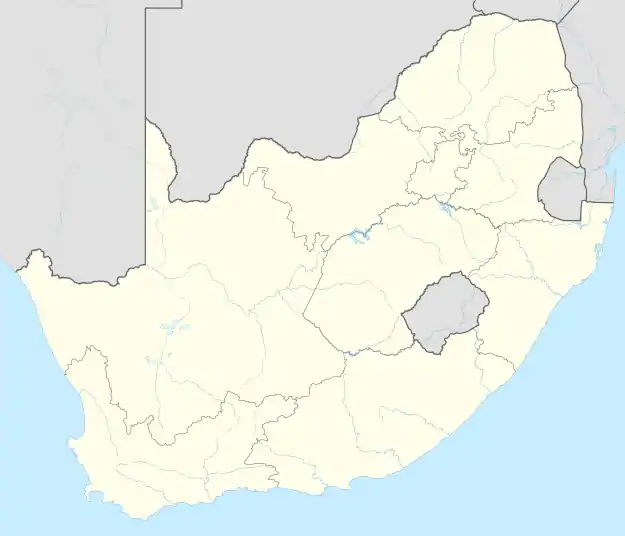Geluksburg
Geluksburg is a small village in the Northern of Drakensberg in the KwaZulu Natal province in South Africa, located approximately 24 km from Bergville, close to Green Point and to the Free State border between the Oliviershoek and Van Reenen mountain passes. The village lies 6 km below the base of the Tintwa mountains of Tintwa Village.
Geluksburg | |
|---|---|
 Geluksburg  Geluksburg | |
| Coordinates: 28°31′S 29°21′E | |
| Country | South Africa |
| Province | KwaZulu-Natal |
| District | Uthukela (IFP) |
| Municipality | Okhahlamba (APEMO) |
| Ward | Ward 13 |
| Ward Councillor | Sfiso khoza(IFP) |
| Area | |
| • Total | 1.21 km2 (0.47 sq mi) |
| Population (2011)[1] | |
| • Total | 231 |
| • Density | 190/km2 (490/sq mi) |
| Racial makeup (2011) | |
| • Black African | 76% |
| • Coloured | 0.6% |
| • White | 33.4% |
| First languages (2011) | |
| • Zulu | 71% |
| • Afrikaans | 22.9% |
| • English | 14.9% |
| • Sotho | 0.9% |
| • Other | 0.6% |
| Time zone | UTC+2 (SAST) |
| PO box | 3377 |
These ridges provide views of the Northern Drakensberg. Furthermore, these foothills contain notable examples of San Rock Art. These are not yet open to the public due to archaeological survey work. The word “Geluk” means ‘luck’ in Afrikaans and ‘Burg’ a town or residential area.
The closest other towns include Bergville, Ladysmith and Harrismith.
History
Geluksburg played a role in the history of the Bushmen (San), Zulu, Boer and British. Firstly inhabited by the Bushman. However, they were forced out of the region by Nguni clans and the early European settlers. King Shaka’s Mfecane during the early 1800s added to their displacement from this area.
The ‘Lost Valley’ located near Geluksburg was an early settlement of ‘Trek Boers’. This group were a “White Tribe” that lived an elementary life. Some five families lost their way from Piet Retief’s primary group, and as a result sought refuge in this valley. They were very reclusive until being discovered by a journalist in the 1950’s. The journalist observed them living in very simple mud dwellings.
The “Lost Valley” is now private farmland. However, tours can be arranged to see the remnants of the homes of this community.
WHAT DO YOU KNOW ABOUT GELUKSBURG:
It was once a thriving town in KZN with a school and a church . Now it's in despair. A lot of people moved away. And only a handful farmers own the land. But now there's is only one school(Maswazi Primary School). The maximum attendances of the NG church today are 15 people. According to Bagder family members of Geluksburg NG church used to be more than 200 congregants. Apparently the bazaars were quite extraordinary. Not a lot goes on there today unfortunately. The church today is now part of the Bergville chapter, although services still take place. There is place nearby called"Die Verlore Vallei" in English translation (The lost valley)
Growing up Badger, heard a lot of stories both good and bad.In the 1830's when the voortrkkers moved away from from the cape colony and come over the drakensberg mountain, some families refused to move further and settle in the lost valley. They remained there for a long time. The world changed they didn't. They had kids and their kids had kids and stayed in the valley. Their ways and traditions stay there for more than hundreds years or so. They didn't know the modern world. They prefered to remain secluded. As the time went by, a lot of their descendants came out of the valley and some nearby Bergville, Winterton. Ladysmith and Geluksburg it's self and caught up with times. Eventually only a handful stayed and what happened to them Badger does not know. Maybe all died out
attendances of the NG church today are 15 people. According to Bagder family, Geluksburg NG church used to have more than 200 congregants. Apparently the bazaars were quite extraordinary. Not a lot goes on there today unfortunately. The church is today part of the Bergville chapter, although services still take place. There is place nearby called the "The verlore vallei" in English translations (The lost valley).
Schools
- Maswazi Primary,
- Rheibokspruit Primary,
- Tintwa Secondary,
- Ekukhuleni Early Childhood Development,
.svg.png.webp)